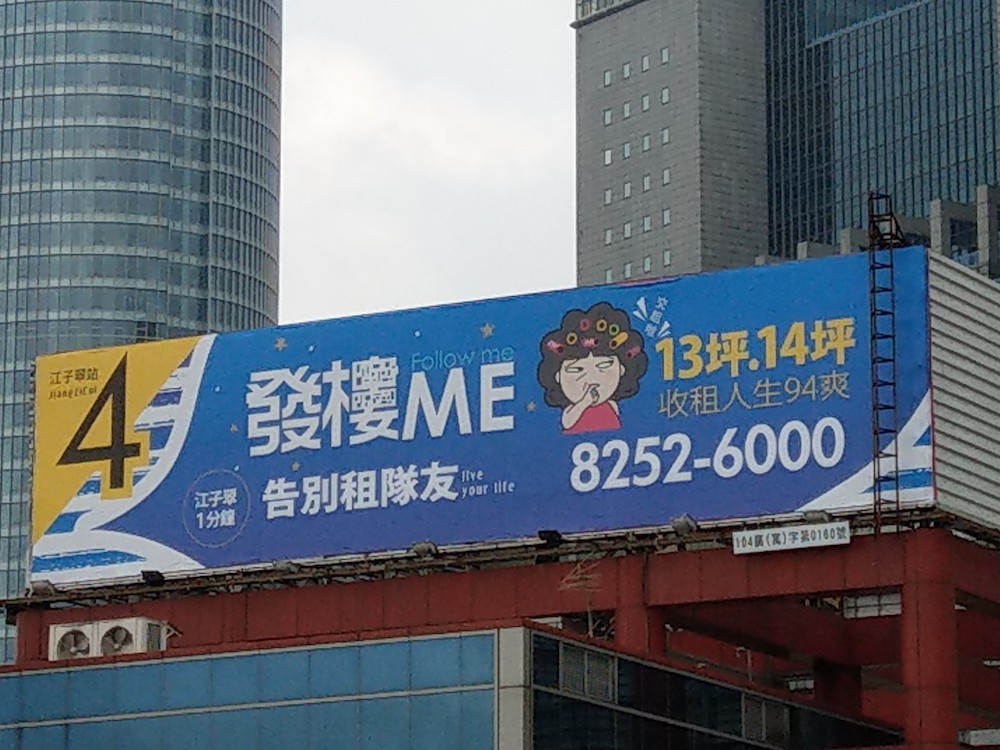Writing English with Sinographs and Chinese with numbers
« previous post | next post »
All in one sign! Here it is:

(Source: Pinyin News)
There is a tremendous amount of clever satire and punning embedded in this large advertisement for inexpensive apartments (near the Banqiao train station, New Taipei City, Taiwan).
fālóu 發樓ME (with the English “Follow me” above the big "ME")
fālóu 發樓 doesn't really mean anything sensible (lit., "generate / emit / release [storied] building") as a lexeme. It's there chiefly to transcribe in characters the sound of the English, though the "fā 發" part suggests becoming wealthy (from fācái ["make money"]) and the lóu 樓 part, of course, means "(multi-story) building", hence you could think of a fālóu 發樓 as a "building that will help you make money".
The next line is quite complicated and is working on many levels:
gàobié zū duìyǒu 告別租隊友 ("say goodbye to your rent paying teammates"), followed by these tiny words in English: live your life
It can only be explained fully in combination with the next, even more complex, line:
shōu zū rénshēng 94 (jiǔsì) shuǎng 收租人生94爽 ("rent collection life is cool / exciting")
Here the "jiǔsì 94" is a near homophone that is standing in for "jiùshì 就是" ("is [precisely / exactly / just like / none other than]")
Taking the above two lines into simultaneous consideration, we may say that the ad is aimed at two separate groups. The first group ("gàobié zū duìyǒu 告別租隊友 ["say goodbye to your rent paying teammates"] live your life") are young adults who are tired of living with roommates and thus would want to buy a place of their own. Most people think that there's also a pun here on zū 租 ("rent"), with that standing in for zhū 豬 ("pig"). So, something like "Say goodbye to living with pigs."
The second group (represented by the woman and the text "shōu zū rénshēng 94 [jiǔsì] shuǎng 收租人生94爽" ["rent collection life is cool / exciting"]) are people who would buy such apartments as investments, making supposedly easy money on rent. Thus, this accounts for the "falou 發樓" — fācái dàlóu 發財大樓
Now, about the size of these apartments, they are either 13 píng 坪 or 14 píng 坪.
A ping, which is a measurement Taiwan acquired from the Japanese tsubo, is the size of two tatami mats, or a total of about 3.3 square meters (35.6 square feet). In Korea, this unit of measure is called a pyeong. It's the standard measure in Taiwan for apartment size. But it's important to note that an apartment's ping does not equal its actual interior space. Rather, it's that interior space plus a portion of all the "public" space in the building.
For example, if your apartment building has a lobby, a prorated portion of that lobby is added to the ping count of your apartment. Is there an exercise room? Ditto. The stairwell and elevator shafts count too. Underground parking? Yup, that as well.
So many apartments are actually at most two-thirds of their nominal size.
To sum up, this kind of language is very common among the young generation in Taiwan, particularly on the internet. In this specific case, owning your own apartment will release you from your friends who are still renting, and those who are still renting are like losers who have been holding you back. The message of this ad is certainly not very kind, but quite witty and humorous nonetheless.
Selected readings
- "Polyscriptal Taiwanese" (7/24/10)
- "Polyscriptal, multilingual packaging for thousand-year eggs" (9/2/18)
- "Multilingual tea packaging" (4/7/18)
- "Biscriptal juxtaposition in Chinese" (8/17/14)
- "Biscriptal juxtaposition in Chinese, part 2" (10/15/14)
- "Biscriptal juxtaposition in Chinese, part 3" (4/24/17)
- "A New Morpheme in Mandarin" (4/26/11)
- "Zhao C: a Man Who Lost His Name" (2/27/09)
- "Creeping Romanization in Chinese" (8/30/12)
- "A trilingual, biscriptal note (with emoji)" (2/5/17)
- "Digraphia and intentional miswriting" (3/12/15)
- "Character amnesia and the emergence of digraphia" (9/25/13)
- "A bilingual, biscriptal product designation in Taiwan" (2/7/14)
- "Biscriptal ad in the Hong Kong subway" (8/25/18)
- "A trilingual, biscriptal note (with emoji)" (2/5/17)
[Thanks to Mark Swofford, Melvin Lee, Chenfeng Wang, and Yijie Zhang]
Bathrobe said,
November 19, 2019 @ 2:44 am
Couldn’t 發摟 / 发楼 just be interpreted as “release of apartments for sale”?
Philip Taylor said,
November 19, 2019 @ 4:08 am
Image is invisible here — insecure content embedded in secure page :
<img src="http://languagelog.ldc.upenn.edu/~bgzimmer/followme.jpg">
referring URL https://languagelog.ldc.upenn.edu/nll/?p=45045
AntC said,
November 19, 2019 @ 3:00 pm
On the size (smallness) of apartments, and what they include: many apartments in these high-rises do not include cooking facilities, because that would need not only a hob/sink/worktop but also venting for the fumes.
So these are more like hotel rooms than apartments. Nobody eats a meal 'at home'; you wouldn't dream of inviting guests in. All entertaining is in restaurants and hawker markets.
I spent a bemusing time wandering through an Ikea in Taiwan, marveling at how small a lounge suite (divan/bed) or a vanity could be.